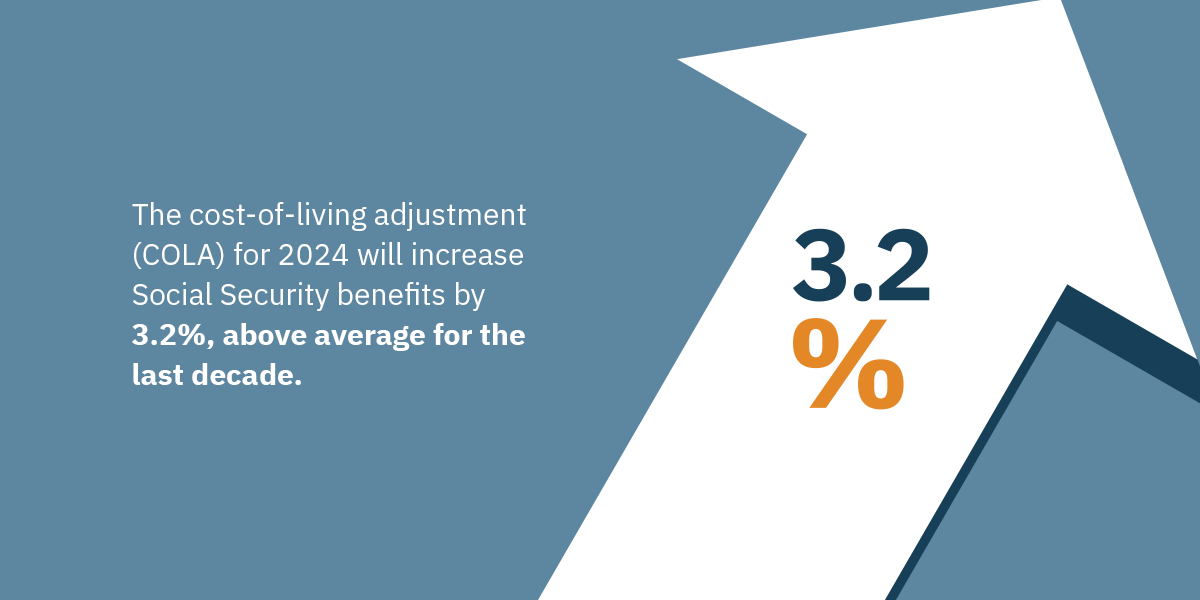What Changes Are Coming to Social Security in 2024?
Over 70 million Americans, including those with disabilities and retirees, receive Social Security benefits. While the program won’t undergo significant reforms in 2024, the new year will still bring a few notable changes to Social Security, impacting beneficiaries and retirees. Specifically, we’ll see a benefit increase and higher earnings limits for early retirees.
These adjustments can influence the financial aspects of your retirement planning, making it essential to understand how they might affect you. Knowing the details will help you confidently navigate your retirement plans.
Here are several changes coming in 2024 you need to know about to make informed decisions for your financial security.
Social Security and Supplemental Security Income Adjustments
Social Security is the only retirement benefit that stays on par with inflation, and Supplemental Security Income (SSI) benefits will also increase to help Americans keep up with their living expenses in 2024.
The cost-of-living adjustment (COLA) for 2024 will increase Social Security benefits by 3.2%, above average for the last decade. This COLA calculation is based on the Bureau of Labor Statistics’ Consumer Price Index (CPI), measuring price adjustments on retirees’ spending patterns. The maximum monthly benefit for someone claiming Social Security at full retirement age (FRA) will be $3,822.
Recipients will see an overall increase in benefits, which includes disability and payouts for widows and widowers. The SSI Federal Payment Standard increases monthly SSI payments to $943 for individuals and $1,415 for couples. COLA notices are sent out in December 2023, but you can also access this information on your Social Security account.
You can review the Social Security COLA Fact Sheet for more information about how the increases might impact your specific situation. Of course, you can always consult with your financial advisor for tailored information and advice.
Income Tax Increase
Tax rates will stay at 7.65% for employees and 15.30% for self-employed people. This remains a combined rate for Social Security and Medicare. Medicare’s portion (HI) is 1.45% of all your earnings. You will also see several beneficial adjustments to the Social Security benefits for 2024.
We will see some changes in the Federal Insurance Contributions Act (FICA) for next year. The payroll tax gap will increase by 5.2% to $168,600 in 2024, affecting a smaller portion of the nation. Self-employed people may see Social Security taxes rise by an additional $1,042.
Higher Retirement Benefits
In the United States, the retirement age is 62. This is when you may receive your benefits and reduced Social Security payments. Delaying your full retirement benefits can earn you an 8% bonus on your monthly benefits every year. It is worth noting that this delay is capped at age 70.
Eligibility for retirement benefits happens by collecting Social Security credits. These credits are allocated as you work for an employer or yourself, where you pay Social Security taxes. In 2024, the credit will increase by $90, so you will receive one credit per $1,730 earned.
The maximum retired worker benefit will increase to $3,822 monthly in 2024. If you start collecting Social Security retirement benefits before you reach your full retirement age and continue to work, the benefits will be reduced. The Social Security Administration (SSA) will reduce benefits by $1 for every $2 you earn over the annual limit. As you reach FRA, benefits are reduced by $1 for every $3 you earn over the higher yearly limit. In 2024, the lower annual earnings limit will increase to $22,320.
Early Filers Keep More Benefits
If you file early while you’re still working, you may get to hold on to more of your benefits. In 2024, the workers’ earnings test limit increases with a 5% bump from $21,240 to $22,320.
Those working in their 60s and collecting Social Security may see deductions depending on their annual wages. This can be a $1 reduction in annual benefits for every $2 you earn above the limit. The Social Security earnings test may reduce your benefits check, but if this happens, your earnings will receive an adjustment as you reach your full retirement age. This means your checks will show an increased amount as a result.
Disability Earning Limit Changes
There are positive changes for individuals with disabilities receiving Social Security benefits while working. These individuals must be unable to engage in a substantial gainful activity to qualify for Social Security disability benefits. Blind workers will have an earnings threshold of $2,590 per month, and non-blind workers with disabilities can make $1,550 a month without losing their Social Security benefits. The trial work period threshold is capped at $1,110 a month.
Increase in Medicare Premiums and Deductibles
Your Medicare Part B premiums — which cover outpatient treatments like doctor visits — are deducted from your Social Security payments. An estimated increase of $9.80 each month in these premiums can undercut your COLA adjustment benefit. Part B rates will increase from $164.90 to $174.70, which takes $10 off your COLA gain. Medicare Part B enrollees will see an annual deductible of $240 due to anticipated healthcare spending increases — up from $226 in 2023.
Medicare Part A inpatient deductibles for beneficiaries will increase by $32 to $1,632 in 2024. Beneficiaries will also pay $408 a day for days 61 to 90 of any hospitalization. Only 1% of Medicare beneficiaries will be liable to pay these Part A premiums.
For more information about Medicare adjustments in 2024 and how they may impact you, review the fact sheet from the Centers for Medicare & Medicaid Services.
Learn More About Social Security Changes With Fort Pitt Capital Group
There are several Social Security changes coming in 2024. Whether you are affected by the COLA adjustment, Medicare premium increase, or disability earning limit changes, it is important to be prepared. Keeping an eye on these updates and consulting a financial advisor will help you navigate and adapt with ease.
Find out how these changes affect you and your retirement plans by contacting Fort Pitt Capital Group. Since 1995, we have led clients toward financial success with exceptional client services, transparency, and apt investment strategies. In addition to helping you plan your retirement, our team can help you manage other areas of personal finance, offering you a comprehensive strategy for success.
Whether you’re currently working and saving for retirement or are already retired and want to understand your Social Security benefits better, we’re here to help with resources and advice. Find out how our services can benefit your financial planning by scheduling a consultation or calling us at 1-800-471-5827. We look forward to hearing from you!





